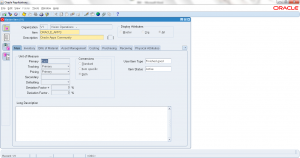2.0 Create Item in Master Organization
- Form Application: Inventory
- Form Name: INVIDITM
- Form Path: /oracle/apps/r12/visr12/apps/apps_st/appl/inv/12.0.0/forms/US/INVIDITM.fmx
Item Master is one of the core focus areas of any ERP system. An item is goods or services offered by any business to make revenue. Items/Services are created in ITEM MASTER first. Item Master consists of Item, description and associated attributes required for each function of business e.g. sales, marketing, purchasing, planning, finance.
In Oracle Items are created first in Item Master Organization and then enabled in other local organizations. Master organization can be dummy or physical organization. Item attributes can be controlled at master level or organization level. Master controlled attributes are always set and managed at item master organization. Organizational item attributes can be set differently in each local organizations.
Navigation:
Inventory responsibility -> Items -> Master Items
- Enter Item Number/name. This must be unique number/name.
- Enter Item description.
Navigate to different tabs of Item master grouped by function to set different item attributes. While you are in item master organization you can set any item attributes, if you are in local organization you can only set organizational controlled attributes.
- MAIN – Set item attributes Primary unit of measure (UOM), Item Type, Item status, log description
- INVENTORY – Inventory Item, stockable, transactable, reservable, revision control, cycle count, Lot control, serial control, shelf life.
- BILLS OF MATERIAL – BOM allowed, BOM Item Type
- ASSET MANAGEMENT – Asset Item type
- COSTING – Costing enabled, Inventory Asset value, Include in roll-up, Cost Of Goods (COGS) account.
- PURCHASING – Purchased, Purchasable, Use Approved Supplier, Default buyer, list price, Out Side Processing item
- RECEIVING – Receipt date controls, Overreceipt quality control, receipt routing
- PHYSICAL ATTRIBUTES – Weight, Volume, Dimensions, Container
- GENERAL PLANNING – Inventory planning method, subcontracting item, Make or Buy, default planner, Min-max quantity, safety stock, sourcing rules, order modifiers, vendor managed inventory
- MPS MRP PLANNING – Planning method, forecast control, pegging, exception set, Time fences.
- LEAD TIMES – Preprocessing, processing, post processing, Fixed, variable, Cumulative Manufacturing, cumulative total, lead time lot size.
- WORK IN PROCESS – Build in WIP, Supply Type, Over Completion
- ORDER MANAGEMENT – Customer Order enabled, Internal order enabled, Shippable, Pick Components, Assemble to order, ship model complete, returnable, RMA inspection required, Check ATP, ATP rules, Shipping tolerances
- INVOICING – Invoice enabled, Invoiceable item, accounting rule, invoicing rule, sales account, payment terms.
- PROCESS MANUFACTURING – Process quality enabled, process costing enabled, recipe enables, hazardous material, process execution enabled
- SERVICE – Service request enabled, service contracts, Install base, Debrief and charges
Save the item details entered. This will create a new item in master organization.


